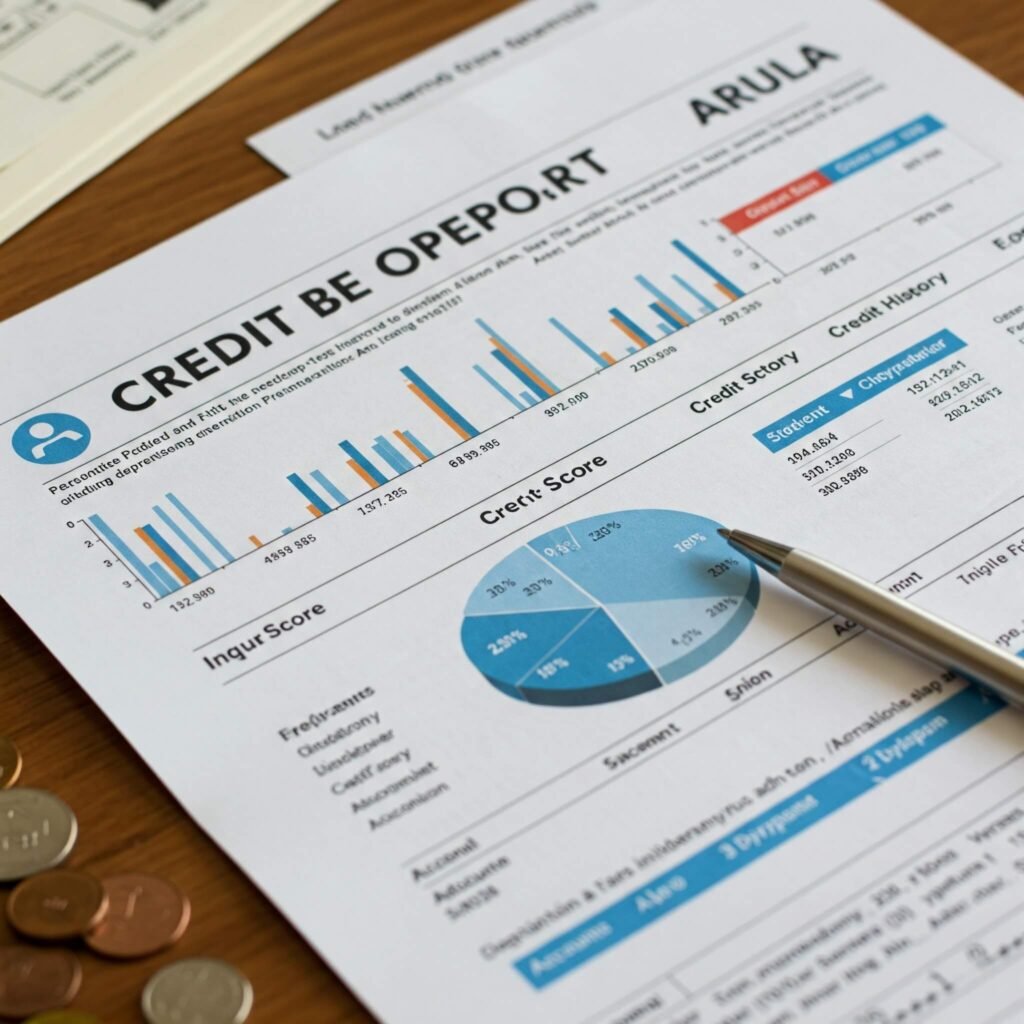We need to talk about something that feels really grown-up and scary, but is also super important: your credit score. For years, it was this mythical beast to me. I knew it existed, I knew it mattered, but how to actually see it? And what the heck was a “good” score anyway? It felt like something only bankers and financial wizards understood, while the rest of us just hoped for the best when applying for a new apartment or a loan.
I distinctly remember a time, years ago, when I was trying to get approved for my first “real” apartment on my own. The landlord looked at my application, then stared me dead in the eye and asked, “What’s your credit score?” I just kinda blinked. “Um… it’s… fine?” I stammered, feeling like an idiot. He just sighed. That was my wake-up call. I realized I needed to figure out how to check your credit score for free (and improve it) because apparently, “it’s fine” wasn’t cutting it in the adulting world.

My Credit Score Confession: From Ignorance is Bliss to “Oh, Shoot!”
For a long time, my relationship with money was like a teenager trying to avoid chores. I knew they were there, I knew I probably should do them, but I just put them off until the last possible second. My credit score? Out of sight, out of mind. I paid my bills, mostly on time, and figured that was good enough. I mean, what else was there, right?
Then came that apartment moment. And later, when I tried to buy my first car and the dealer looked at me like I was trying to pay with Monopoly money when he saw my score. “Hmm, that’s… interesting,” he said, trying to be polite while clearly thinking, “Wow, this is rough.” It was a tiny, tiny ding from a forgotten library fine from college that had somehow ended up on my report. A library fine! I almost lost it.
That’s when I realized ignorance was NOT bliss. It was actually costing me money (higher interest rates) and potentially opportunities (like that apartment!). So, I decided to finally face the music and figure out this whole credit score thing. And let me tell you, it’s not nearly as scary as it seems. In fact, knowing how to check your credit score for free is actually pretty empowering.
What Even IS a Credit Score, Anyway? (And Why Does It Matter So Much?)
Alright, let’s break it down in plain English, because no one needs fancy financial jargon. Think of your credit score as your adulting report card for how good you are at managing borrowed money. Every time you:
- Get a credit card
- Take out a loan (car, student, mortgage)
- Pay your bills (or don’t)
- Apply for new credit
…all that activity gets reported to three major credit bureaus: Experian, Equifax, and TransUnion. These bureaus collect all that data and create a “credit report” for you. Then, a magical algorithm (usually FICO or VantageScore) looks at that report and spits out a number: your credit score.
Why does it matter? Because almost everyone who’s going to lend you money, rent you a place, or even offer you certain insurance rates, is going to peek at that number. A good score means you’re a reliable borrower – lower risk for them, better rates for you. A low score? Higher risk, higher interest rates, and sometimes, outright rejection. It’s the gatekeeper to a lot of financial doors.
How to Check Your Credit Score for Free (The Not-So-Secret Secrets!)
Okay, this is the good stuff. For years, I thought you had to pay some sketchy website to get your score. Nope! The law, bless its heart, made it easier.
1. AnnualCreditReport.com (Your Yearly Freebie for Reports)
- What it is: This is the official, government-mandated site where you can get a free copy of your credit report from each of the three major bureaus (Experian, Equifax, TransUnion) once every 12 months.
- Why it’s awesome: This is the most comprehensive look at your credit history. It shows every account, every payment, every inquiry. It’s not your score directly, but it’s the raw data that creates your score. Think of it like getting the ingredients list before you taste the cake.
- Pro Tip: You can stagger them throughout the year! Get one report from Experian in January, Equifax in May, TransUnion in September. That way, you’re monitoring your report regularly.
- My Experience: When I finally pulled my reports, it was eye-opening. That stupid library fine was there! Also, an old phone bill I swore I paid. It’s like finding old skeletons in your financial closet. Super important for catching errors, which can ding your score!
2. Your Bank or Credit Card Company (They Want You to Stay!)
- What it is: A ton of banks and credit card companies now offer free credit scores to their customers. Chase, Bank of America, Capital One, Discover, Citi – many of them do it. It’s usually integrated into your online banking portal or monthly statement.
- Why it’s awesome: Super convenient! It’s right there where you manage your money anyway. These are usually FICO or VantageScore scores, and they update monthly.
- Pro Tip: Check if your existing accounts offer this. It’s a quick, easy way to keep an eye on things without jumping through hoops.
- My Experience: This is my go-to for regular monitoring. My credit card company updates my score every month, and it’s super handy to see if my good (or bad!) habits are paying off. It’s a lifesaver for knowing how to check your credit score for free constantly.
3. Free Credit Score Websites (The Ad-Supported Helpers)
- What it is: Sites like Credit Karma, Credit Sesame, NerdWallet, and Experian’s own free service. They usually offer a free score (often VantageScore, which is a bit different from FICO but still useful) and insights into your credit report.
- Why it’s awesome: They often provide educational tools, tips, and alerts for changes on your report. They’re super user-friendly.
- Pro Tip: These sites are generally reliable for monitoring your score and report for changes. Just be aware they usually make money by showing you ads for credit cards and loans based on your profile. Don’t feel pressured to sign up for anything!
- My Experience: Credit Karma was my first real introduction to tracking my score. It felt less intimidating than the official bureau sites. They showed me what factors were impacting my score and gave me tips. It was a game-changer for understanding how to check your credit score for free and what to do with that info.
How to Improve It (The Not-So-Secret Strategies)
Okay, so you’ve checked your score. Maybe it’s great! High five! Maybe it’s… “interesting,” like mine was. No worries! Improving your score is totally doable, but it takes time and consistency. Think of it like getting in shape – no magic pills, just good habits.
1. Pay Your Bills. On Time. Every Time. (The Golden Rule)
- Why it matters: Your payment history is the biggest factor (around 35%!) in your FICO score. Missing a payment, even by a few days, can drop your score.
- Actionable step: Set up auto-pay for minimums (or full balances!) on all your credit cards, loans, and even utility bills. Use calendar reminders. Do whatever it takes.
- My Experience: This was number one on my “fix it” list. I used to be a little laissez-faire with due dates. Now? Everything is auto-paid. It’s a game-changer for stress levels and my score.
2. Keep Your Credit Utilization Low (The “Don’t Max Out” Rule)
- Why it matters: This is the second biggest factor (around 30%). It’s how much credit you’re using compared to how much credit you have available. If you have a $1,000 credit limit and you’ve used $900, your utilization is 90% – that’s high! Lenders prefer to see it below 30%, ideally even lower.
- Actionable step: Pay down your balances. If you can’t pay them off, pay them down as much as possible. Don’t max out your cards.
- My Experience: I was totally guilty of this. I had a small credit card, and I’d use it for everything, then pay it off at the end of the month. But the reporting sometimes happens before my payment, so it looked like I was using 90% of my credit. Now, I try to pay it down mid-month if I’ve used a lot.
3. Don’t Close Old Accounts (The “Longer is Better” Rule)
- Why it matters: The length of your credit history (around 15%) is important. Older accounts with good payment history look good. Closing an old account, even if you don’t use it, can shorten your average credit age and reduce your available credit, which instantly spikes your utilization.
- Actionable step: Keep old credit cards open, especially if they have no annual fee. Just use them for a small, recurring charge (like a streaming service) and set up auto-pay so it’s always paid on time.
- My Experience: I almost closed my first credit card because I thought, “I don’t use this anymore.” So glad I didn’t! It’s my oldest account and gives my credit history a nice, long backbone.
4. Mix It Up (The “Variety is the Spice of Life” Rule)
- Why it matters: Having a mix of credit types (like a credit card, an auto loan, student loan, mortgage) can show you can manage different kinds of debt responsibly. This accounts for about 10% of your score.
- Actionable step: This isn’t something to rush into. Don’t take out loans you don’t need just for a better score! But over time, as you acquire different types of debt (e.g., student loans naturally, then a car loan), managing them well helps.
- My Experience: This one kinda just happened naturally as I grew up – student loans, then a car loan. It helped my score without me even realizing it at the time.
5. Be Mindful of New Credit (The “Don’t Go Crazy” Rule)
- Why it matters: Every time you apply for new credit, it results in a “hard inquiry” on your report, which can ding your score a few points. It also shortens your average credit age. This is about 10% of your score.
- Actionable step: Only apply for new credit when you truly need it. Don’t open five new credit cards at once for sign-up bonuses. Group your loan applications (like for a mortgage) within a 14-45 day window so they count as a single inquiry.
- My Experience: I used to jump at every “pre-approved” credit card offer. My score probably looked like a rollercoaster during that phase. Now, I’m way more selective.

The Bottom Line: Your Credit Score is Your Friend
Look, your credit score isn’t a judgment on your character. It’s just a number, a tool. But it’s a powerful tool that can save you a ton of money (or cost you a ton). Knowing how to check your credit score for free (and improve it) is one of the most adulting things you can do for yourself.
It takes time, effort, and consistency. You won’t see a massive jump overnight. But by implementing these strategies, you’ll slowly but surely build a stronger financial foundation. And trust me, the feeling of confidently telling a landlord or a loan officer your credit score? Priceless. You got this!

Outbound Links:Outbound Links:
- For the official, government-mandated free credit reports (not scores, but the underlying data!), this is the only site you need: AnnualCreditReport.com (This links directly to the official site).
- For more in-depth explanations and personalized advice on improving your credit score, NerdWallet is consistently a great, user-friendly resource: NerdWallet – How to Improve Credit Score (This links to their comprehensive guide on credit score improvement).





